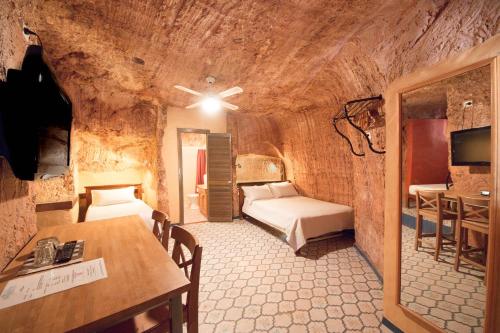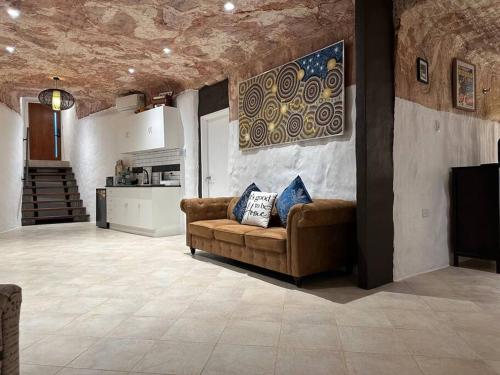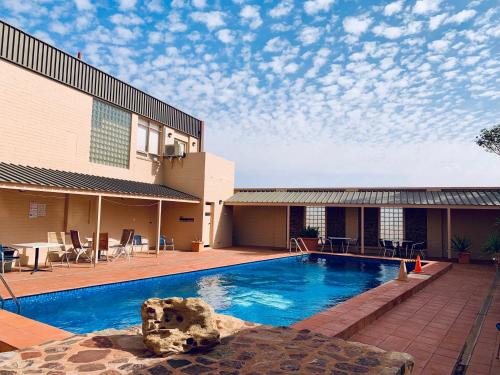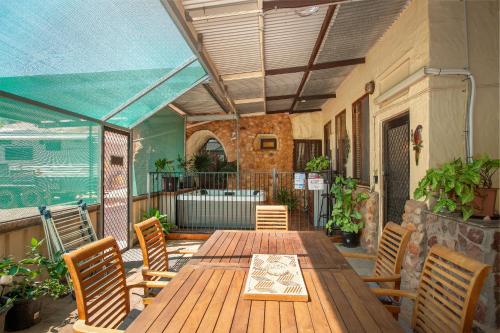In the middle of the Australian desert, search hard enough and you’ll find a gem. Thousands of people over the years have come looking for it.
For many it has brought success, for others it has been their downfall. Such is the way when the stakes are so high.
This gem? It’s called Coober Pedy.
On the surface, the existence of the town of Coober Pedy seems odd. It’s in the nowhere of South Australia, about 850 kilometres north of Adelaide.
In summer, the heat is scorching. In winter, it is freezing. Head in any direction and it’s hours through the red earth until you reach anything you might call ‘civilisation’.
But Coober Pedy is not about what is on the surface. It’s about what’s underground and there are two very important things there – opals and homes.
Opals were first found in the ground around Coober Pedy in 1915 and since then the small town has been supplying most of the world’s high quality opals.
Buyers from around the world fly in to the tiny airstrip for the day to make deals with briefcases of cash. Hundreds of thousands of dollars are can be exchanged in just hours.
But it all has to come from somewhere and Coober Pedy is interesting in the sense that it hasn’t been taken over by a handful of large mining companies. This is still a place where anyone can make it rich with some basic knowledge and a bit of luck.
Each mining plot that is leased to prospectors is a square, 15 metres by 15 metres.
It’s always been cheap enough to lease a plot that someone with nothing can arrive in town and start digging. The problem is that most of the plots have no valuables in them. It’s all about finding the right spot.
News of a new opal find will spread through town like hot gossip and other prospectors will quickly lease the plots around it. For this reason, miners are normally very secretive about any success.
But the locals aren’t stupid… they keep an eye on the size of the dirt mounds at different sites – the more dirt in the pile, the more digging going on, the more interesting the plot.
If the miners are secretive and competitive out on the fields, they generally leave it there. The community is small – less than 2000 permanent residents – and they wouldn’t survive if they didn’t look out for each other.
There may be dozens of nationalities here, with people trying their luck from around the world, but there’s no room for international conflicts and rivalry.
The temperature in Coober Pedy reaches well above 40 degrees Celsius in summer and below zero degrees in winter.
Back in the days when the town was founded, air conditioners and heaters weren’t realistic options for residents – the power or fuel to run them was unavailable or too expensive.
So the first mining residents came up with an innovative idea… to build the houses underground.
It’s one of the things you hear about Coober Pedy before you go there – “the houses are underground”. I had known that for years and years, even though I had never visited before.
In my mind’s eye, I had this image of a hole on the surface with a ladder that took you down into a home with tunnels between rooms. It’s not like that.
Actually, most of the ‘underground’ houses look exactly like normal houses except there are no windows. Most of them have been cut into the side of hills or have sloping driveways down to the entrances, so there’s no holes or ladders.
The front of the houses are often in the open air, with a terrace. It’s when you go beyond the front doors that you have rock all around you.
I see inside one of the houses as part of the tour I’m doing through Coober Pedy for the day. I’m on an excursion from The Ghan Expedition, the epic train journey from Darwin to Adelaide that stops at some key points through the middle of Australia.
It’s a full day tour and as well as seeing the underground house, we visit the underground Serbian Orthodox Church which is beautifully decorated inside rock.
A local miner explains what life is like in the town (tough, as you might imagine), and then there’s special lunch inside an old mine. In a cavern where opals had once been dug out, the meal is served without windows.
In a country where 85 per cent of people live within 50 kilometres of the coast, it’s sometimes easy to forget (or not know) what life is like in these small remote towns.
It was the chance of riches that brought most people to Coober Pedy and fortunes have been found and lost. With advances in technology, it’s easier living here than ever before but nothing can change the geography and it still feels isolated.
As tourism increases (and it’s now a big industry here) more visitors are getting an insight into the town.
Many people come for the gems found in the earth but Coober Pedy is a gem in itself. To see its full colours, you need to search underground as well.
THE BEST ACCOMMODATION IN COOBER PEDY
Perhaps the biggest decision to make when you’re choosing where to stay in Coober Pedy is whether to be above ground or underground.
MOTEL

A unique experience, The Underground Motel gives you a true local experience with cool comfortable rooms and access to a share kitchen.
APARTMENT

Feel like a local in the Cozy Cave apartment, with a spacious living area, fully equipped kitchen, and modern amenities.
HOTEL

With spacious underground or above ground rooms, Desert Cave Hotel also has a underground bar, fine dining restaurant, and outdoor pool.
HOUSE

If you need more space, Di’s Dugouts has fully equipped homes with modern amenities and stunning desert views.